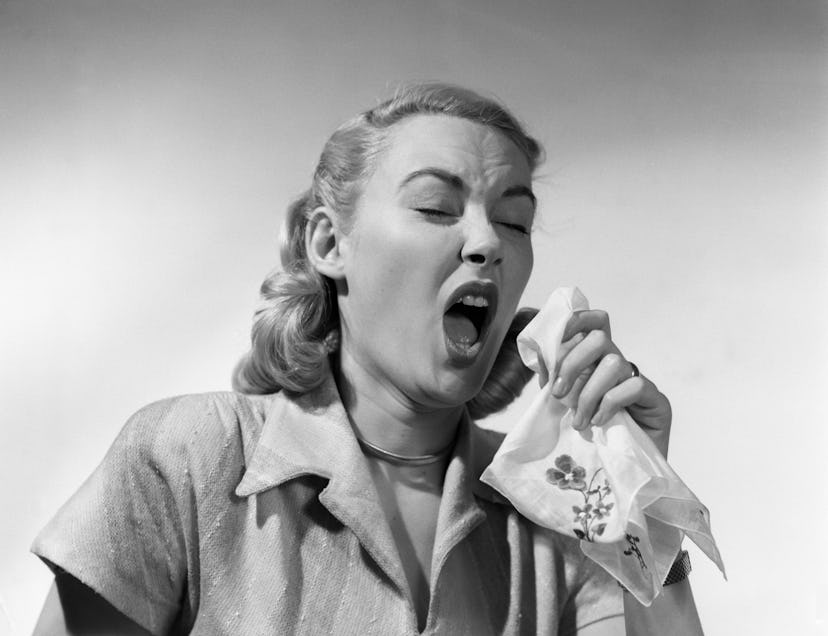Smell You Later
Meet The Sniffly Women Struggling Through Peak Fragrance
Perfume has never been more popular, and allergies have never been more common.

There are many perks of working in women’s media: access to clothes, wellness products, and, of course, makeup. But for one such editor, the latter presented a major problem. “I used to sit right in front of the beauty closet, which was more of a cupboard than an actual closet, and whenever a beauty editor came by to grab something, I’d have to literally hold my breath while they were rummaging through it, and for about 30 seconds after they’d left,” Lauren,* 32, tells Bustle. The problem? Her fragrance sensitivity. “I once did an internship that used a synthetic lavender soap in the bathrooms and kitchen. I was dizzy for basically the entirety of the internship!”
In the era of Peak Fragrance, it’s becoming harder and harder for allergy sufferers like Lauren to avoid such flare-ups. In 2022, the fragrance category pulled in $70 billion in sales, and the sector is only projected to skyrocket from there. Many attribute this rise to the increasingly popular corner of TikTok devoted to fragrance, known as “PerfumeTok” — which has amassed over 4.5 billion views, established a roster of high-profile fragrance influencers, and become a cottage industry unto itself. (Even the most unlikely of demographics, Gen Alpha boys, have found themselves influenced: proselytizing to the New York Times about saving up their allowances for $300 bottles of cologne.)
But it’s not just social media. Look at the niche but much-celebrated Dirt media perfume collab, or the fervor for the website, Fragrantica. From suburban teens to Brooklyn creatives, it’s clear that scents have never carried more cultural cache.
Meanwhile, the rate of allergies is also on the rise, and the American Academy of Dermatology has found that nearly 2.5 million Americans have fragrance-specific ones. Some discover their sensitivities early in life, like 25-year-old Maris Hammerman, who was first confronted with hers when a friend sprayed her with Bath and Body Works Sweet Pea perfume. “I immediately blew up in hives, got an itchy throat, and called my mom crying to pick me up,” she says.
Others spend years without a diagnosis, leading to lots of preventable itchiness. This includes women like health and wellness influencer Hollye Williams, who struggled with painful eczema for most of her life before a skin sensitivity test finally revealed the source of her unexplained flare-ups.
“Once [I stopped] using fragrance, encountering it in the public makes my symptoms so much more noticeable. I will often make a point to walk out of my way to avoid stores like Bath & Body Works because even stepping inside can give me an instant headache,” says Williams, who now even brings her own fragrance-free shampoo to the hairdresser to avoid irritating her scalp.
“I was going to Hollister with a couple friends in late elementary school, and when I walked into the store, I immediately felt dizzy and a tightness in my chest.”
Not all reactions are as severe as Williams’. People report sneezing, itchy eyes, and headaches. Dizziness is also common, which is what first tipped Amara Balan off to the fact that she might have a fragrance sensitivity. “I was going to Hollister with a couple friends in late elementary school, and when I walked into the store, I immediately felt dizzy and a tightness in my chest,” says Balan, who’s now a 26-year-old New Yorker. These days, the extent of her reaction depends on the strength of the scent. “It’s always worse with more saccharine smells, particularly when they're super artificial.”
Perhaps surprisingly, many of these women are still desperate to find their way into the fragrance craze, Balan included. “I’m jealous of you perfume people! In college at a party once, I saw a 22-year-old, 6-foot-tall man fully burst into tears because a girl walked by who was wearing the same perfume as his ex,” she recalls. “I wish I could have that power!”
Some have found workarounds. “I’ve always wished I had a signature scent. It’s like a personality trait,” says a TikToker who asked to be identified by her handle, simplytaylorb. “With the help of #Perfumetok I was able to find allergy-friendly perfumes! I think people are gearing more toward the #cleangirl scents, which I can appreciate.”
The lifestyle influencer known as Zeopatra also took matters into her own hands. “I’m Arab and I grew up loving perfumes. It’s a big part of our culture,” she explains. On TikTok, she reviews scents that are safer for people with sensitivities, such as Sellier by Byredo and Maison Margiela’s REPLICA by the Fireplace — and promotes incense sticks she’s created with this community in mind.
The scent-sensitive community does have one request for perfume lovers: Don’t equate a lack of fragrance with a lack of hygiene. “People think that if you use unscented soaps or even unscented deodorants, it means you're OK with being stinky,” says Ballan. “But ‘clean’ doesn’t need to mean ‘heavily fragranced!’”
At last, something we can all agree on: No one wants to smell bad.
*Pseudonyms have been given upon request.